Multi-Signature Address is a Bitcoin wallet that requires signatures from multiple parties to create an address with a public key. When someone wants to send a Bitcoin balance to another wallet, he or she needs the signatures of several people, including his own, to do so.
The number of signatures required depends on the amount agreed upon when the Bitcoin address was created. This is the reason why the Multi-Signature Address is much more secure.
Multi-signature (multi-sig) or Multi-Signature Address refers to requiring multiple keys to authorize Bitcoin transactions, rather than a single signature of a single key. It has a number of applications. Dividing the responsibility for bitcoin ownership among many people. Multisignature, also called multisignature, is the requirement that a transaction has two or more signatures before it can be executed. Multisig provides more security than single-signature transactions.
In Bitcoin there are so far two types of addresses:
- Default address, for example “15Cytz9sHqeqtKCw2vnpEyNQ8teKtrTPjp”. It is technically referred to as P2PKH (Pay To Public Key Hash) and starts with a “1”.
- Multisig address, for example this is “347N1Thc213QqfYCz3PZkjoJpNv5b14kBd”.
Create a multisig address
To create a multisig address, you need two or more public keys to generate it. Multisig addresses start with the number 3. The more keyholders or signers you want, the more public keys you’ll need.
For example, if you want 3-of-5 people to be asked to sign a transaction to send, you will need 5 public keys and 3 will be asked to send funds from them.
How does multisig address work?
Multi-signature (multisig) refers to requiring multiple keys to authorize a Bitcoin transaction, rather than a single signature of a single key. This multi-signature (multisig) has a number of applications. Dividing the responsibility for bitcoin ownership among many people.





